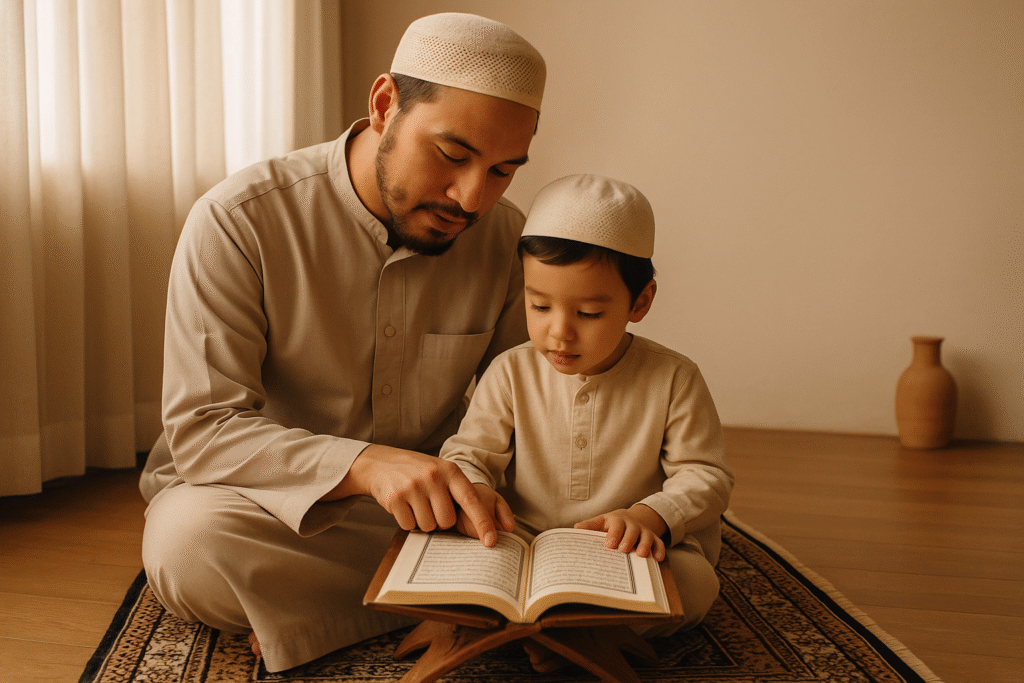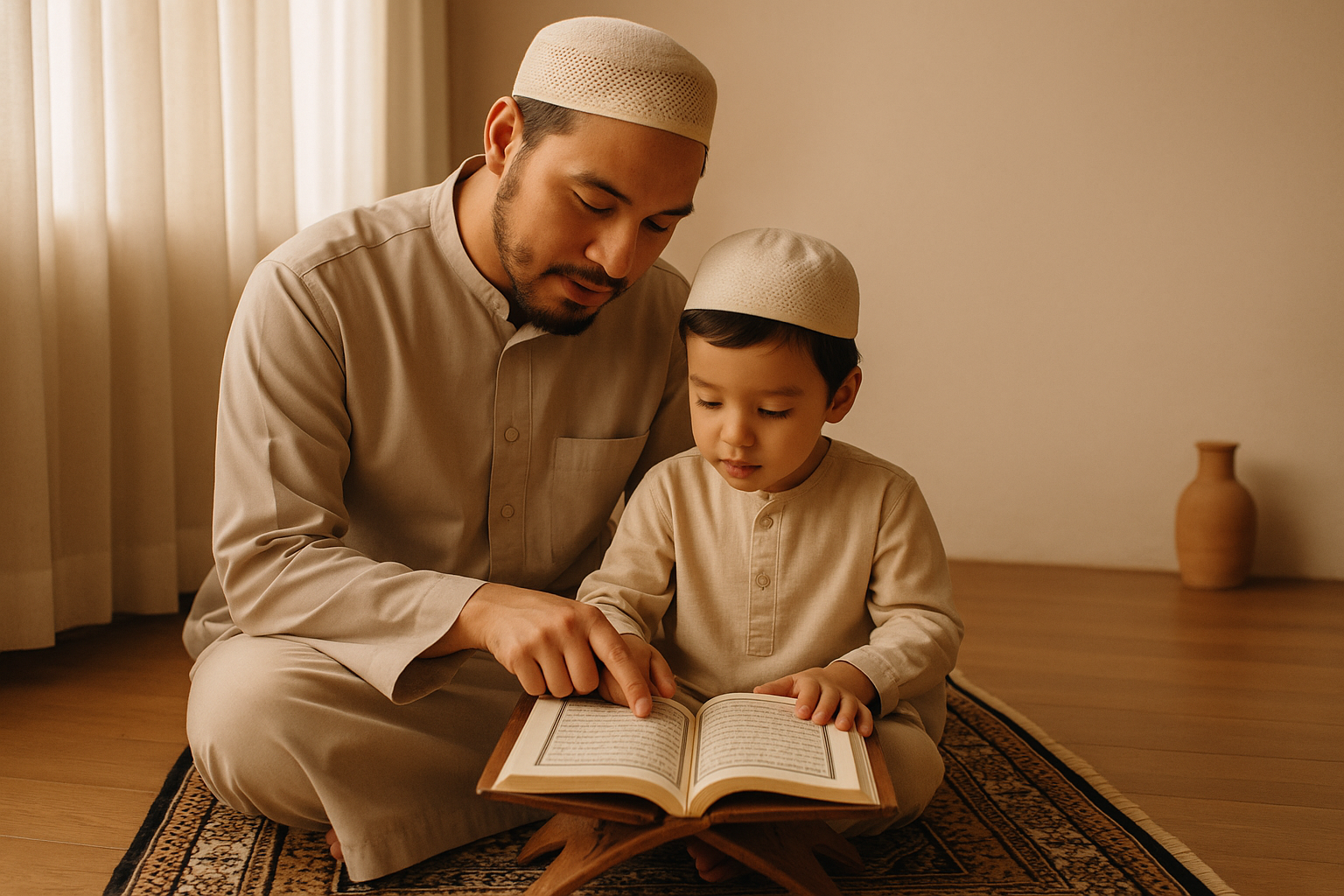
Introduction
Fatherhood in Islam is not just about providing shelter and sustenance; it is a sacred trust and an opportunity to follow the Prophetic model of mercy and leadership. In the Qur’an, Allah reminds us:
“O you who have believed, protect yourselves and your families from a Fire whose fuel is people and stones.” (Qur’an 66:6)
This verse shows that a father’s responsibility extends beyond material provision — it includes nurturing faith, love, and strong character in his children. The Prophet Muhammad (pbuh) embodied fatherhood with balance, compassion, and guidance. By studying his habits, Muslim fathers today can strengthen their bonds with children while earning Allah’s pleasure.
Below are seven daily habits of the Prophet (pbuh) that every Muslim father can integrate into his life.
1. Show Affection Openly
Many fathers hesitate to show affection, thinking it makes them appear weak. Yet the Prophet (pbuh) was known for his tenderness. He kissed and embraced his children and grandchildren, saying:
“He who does not show mercy will not be shown mercy.” (Bukhari & Muslim)
Practical Steps for Fathers:
- Hug your child at least once daily.
- Say “I love you” out loud.
- Create a bedtime ritual of affection — a kiss on the forehead or a gentle du’a.
2. Spend Intentional Time Together
Despite his immense responsibilities, the Prophet (pbuh) always made time for family. He carried children on his shoulders, prayed while holding them, and allowed them to sit with him in gatherings.
Practical Steps:
- Schedule 15–20 minutes of “child time” daily (no phone, no work distractions).
- Use small windows — driving to school, post-Maghrib walk, or storytime before bed.
- Show joy when you see your child; the Prophet’s face would light up with a smile.
3. Listen Attentively
Children thrive when they feel heard. The Prophet (pbuh) gave full attention even to the youngest. He would not interrupt or dismiss their words.
Practical Steps:
- When your child speaks, pause what you’re doing and give eye contact.
- Avoid correcting mid-sentence; let them finish.
- Validate feelings: “I understand you felt upset when that happened.”
4. Teach Values Through Action
The Prophet (pbuh) never relied only on words. He modeled prayer, honesty, and kindness in daily practice. Children naturally imitate what they see more than what they hear.
Practical Steps:
- Pray salah in congregation with your children.
- Let your child see you reading Qur’an.
- Demonstrate honesty in small matters — returning extra change, speaking truthfully.
5. Encourage Dignity and Confidence
The Prophet (pbuh) never humiliated children. He corrected mistakes with dignity. For example, when a young boy ate from all sides of a dish, the Prophet gently guided him:
“O young boy, say ‘Bismillah,’ eat with your right hand, and eat from what is near you.” (Bukhari, Muslim)
Practical Steps:
- Correct mistakes privately, not in front of others.
- Praise effort rather than only results.
- Allow children to try, fail, and learn.
6. Balance Justice with Mercy
The Prophet (pbuh) was fair and consistent, but never harsh. He combined discipline with gentleness, guiding rather than punishing excessively.
Practical Steps:
- Set clear house rules and be consistent.
- Avoid yelling — use calm firmness.
- Teach consequences through learning moments (e.g., cleaning a mess instead of scolding).
7. Make Du’a for Your Children
Prophets in the Qur’an frequently made heartfelt du’as for their children:
- Ibrahim (as): “My Lord, make me an establisher of prayer, and [many] from my descendants.” (Qur’an 14:40)
- Zakariya (as): “Grant me from Yourself a good offspring.” (Qur’an 3:38)
Practical Steps:
- End each prayer with du’a for your child’s iman and akhlaq.
- Teach your child to make du’a for themselves and you.
- Write a short family du’a list and read it together daily.
Daily Prophetic Fatherhood Checklist
Here’s a simple tracker you can apply:
- Hug or kiss your child today
- Spend 15 minutes distraction-free
- Listen fully without interruption
- Show one Islamic action (prayer, charity, Qur’an)
- Correct gently, praise effort
- Stay consistent with mercy
- End day with du’a
Conclusion
Fatherhood is both a blessing and a test. By reviving these seven prophetic habits, Muslim fathers can nurture children who are emotionally secure, spiritually guided, and deeply connected to them. Each hug, each prayer together, and each gentle correction is not only an act of parenting but an act of worship.
CTA: Start today by downloading the Father–Child Bonding Fathers’ SpotChecklist at Halalings.com — a practical tool to help you implement these habits daily.





